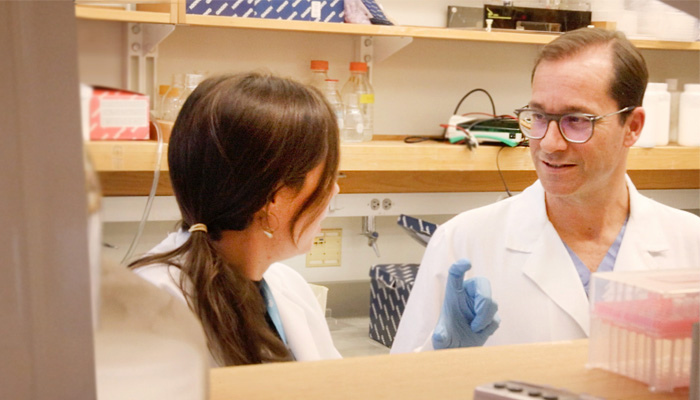HOW CAN WE HELP YOU? Call 1-800-TRY-CHOP
In This Section
CHOP Researchers Study Base-editing Therapies for Three Genetic Diseases of Newborns

Co-led by Dr. William Peranteau, a team of researchers from CHOP and Penn are working to develop “one-and-done” new base-editing therapies for three genetic diseases of newborns.
A collaborative team of researchers from Children's Hospital of Philadelphia and the Perelman School of Medicine at the University of Pennsylvania are developing one-and-done new therapies using a type of CRISPR gene editing technology, called base-editing, to correct the underlying genetic problem for three rare, incurable genetic diseases that affect newborns.
"CRISPR editing technology is uniquely suited to tackle some of these rare genetic diseases for which other therapies are not available," said William Peranteau, MD, an attending surgeon at CHOP, "and CHOP and Penn are uniquely suited to be leaders going forward in developing these novel types of therapies because of the expertise and collaborative environment that exists."
Dr. Peranteau is co-leading the study, funded by a $26 million grant from the National Institutes of Health, along with co-PI Kiran Musunuru, MD, PhD, MPH, director of Penn Cardiovascular Institute's Genetic and Epigenetic Origins of Disease Program.
The researchers are working to directly and permanently correct gene mutations or alter genes at the DNA level in the liver, either after or before birth, for three inherited disorders of metabolism: phenylketonuria (PKU), hereditary tyrosinemia type 1 (HT1), and mucopolysaccharidosis type 1 (MPSI), more commonly known as Hurler syndrome. These diseases, resulting from mutations in single genes, cause debilitating and even life-threatening medical problems that manifest early in life and can even begin before birth.
The grant supports IND-enabling studies (Investigational New Drug Application) with the aim to get to clinical trial for at least one of these diseases by the end of the five-year grant period. The team is hopeful all three projects will one day make it to clinical trial.
"Every patient with a genetic disease, deserves to have somebody try to develop and optimize a therapy that could be life changing for that patient and their family," Dr. Peranteau said.
Testing the Editing Strategy
The grant is divided into three research projects, one for each disease. Project one will focus on postnatal treatment of PKU; the second (HT1) and third (Hurler syndrome) projects have a focus not only in developing a therapy that could be applied after birth, but there is also a biological rationale for a potential benefit of treating the diseases in utero, or before birth.
The research team is specifically focused on adenine base-editing, a CRISPR-mediated editing approach where a specific base is changed, from an adenine to a guanine. Base-editing uses an enzymatically impaired Cas9 that only nicks a single strand of the DNA and does not cut both DNA strands, making it inherently safer then traditional CRISPR editing strategies. By targeting progenitor cells, which may be more abundant and accessible in certain organs before birth, the genetic edit gets propagated on to subsequent cells, so the patient does not have to be redosed.
Depending on the disease, making that change in the target gene in the liver can either correct the disease-causing mutation by changing the errant adenine to guanine, or it can inactivate a gene in a pathway to prevent the accumulation of toxic substrates, mitigating the disease that way.
All three projects will follow a similar path in that the research team will test the editing strategy in vitro, in cell culture with human cells, to show that they can make the desired therapeutic edit and evaluate any undesired editing in human cells. Then they will apply this editing strategy in vivo, initially working with a murine model.
"This will show not only that we can make the targeted change in the DNA, in vivo, in the organ of interest — the liver – but also we could potentially correct the underlying disease phenotype or symptoms," Dr. Peranteau said.
For projects one and two, the researchers are using lipid nanoparticles (LPNs) to deliver the base-editing messenger RNA and the guide RNA to introduce the therapeutic edit. For project three, they will use an adeno associated virus, a non-enveloped virus that can be engineered to deliver the base-editing technology — postnatal and prenatal — to correct the disease-causing mutation to treat the disease.
"The first step is to demonstrate the safety and potential efficacy of the editing therapy in a clinical trial in a postnatal patient," Dr. Peranteau said. "After that, we would consider a prenatal approach for select diseases."
Collaborative Environment is Key
Among the research team are worldwide gene therapy experts from CHOP including Lindsey George, MD; Rebecca Ahrens-Nicklas, MD, PhD; Beverly Davidson, PhD; Alan Flake, MD; and Mohammed-Gabriel Alameh, PhD. In addition to Dr. Musunuru, Xiao Wang, and Drew Weissman, MD, PhD, 2023 Nobel Laureate in Medicine, are collaborators from Penn. They meet each week to discuss all three projects.
"This is a great collaborative effort. We are all involved in every aspect of the grant," Dr. Peranteau said. "What we have at CHOP and Penn is unique and makes for a great place to do this research — in addition to being experts in their fields, the team members are fun people with whom to work, making the research productive and enjoyable to pursue."